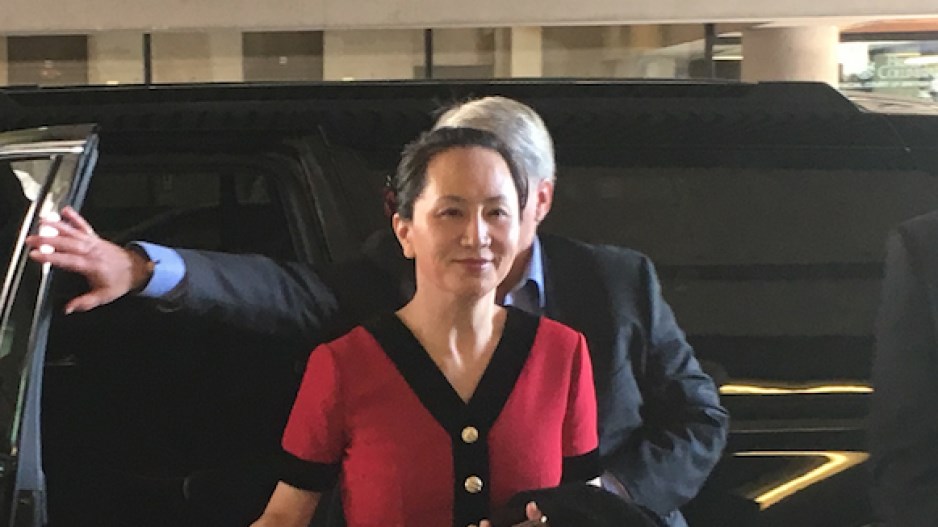The high-profile Meng Wanzhou extradition case returns to court today in Vancouver and will – over the span of the next month or so – determine the Huawei Technologies Co. Ltd. CFO’s legal status as she fights fraud charges in the United States.
The case, which has already taken more than two years to get to this point (after Meng’s Dec. 1, 2018, arrest at Vancouver International Airport on a U.S. extradition request), centred Monday on whether new evidence showing bank HSBC knew of Meng and Huawei’s business activities in Iran should be included in the hearings in the upcoming weeks.
The U.S. Department of Justice said Meng hid that fact from HSBC officials, thus exposing the bank to punitive measures and reputational loss in the United States where sanctions against Iran were in place. Meng’s lawyers have said that Meng clearly stated her and Huawei’s involvement in the Iranian market through an associate company at a meeting that included HSBC senior officials.
On Monday, Crown attorney Robert Frater outlined the Attorney General of Canada's strategy - a lot of repetition of its main points.
"Today marks the beginning of seven weeks of court appearances that will conclude the extradition hearings," Frater said. "... I expect to hear you say, 'Mr. Frater is starting to sound like a broken record.' The goal is to bring focus to these proceedings. Extradition is not a trial."
To that end, Frater argued that the defence's attempt to introduce new evidence this late in the proceedings is to "distract" the court from its well-defined role of determining the merits of extradition, not to assess the evidences' reliability or to question the trustworthiness of specific witnesses.
"You are not here to draw inference on [witnesses'] state of knowledge," Frater said. "The weight of evidence against something does not make it manifestly unreliable... [The defence] is trying to provide building blocks to a case they are not allowed to make."
Meng lawyers asserted that the defence holds evidence that shows a top HSBC global relationships manager knew well ahead of a pair of Reuters stories in 2011 and 2012 that Skycom operates in Iran with Huawei as the ultimate decision-maker behind the operations. The defence is applying to add these pieces of evidence to the proceedings.
Lawyers notes that - despite Huawei technically selling Skycom to another company in 2007 - that company’s bank accounts were still controlled by Huawei, and HSBC had the documents and e-mail correspondences to show the relationship was a well-known fact within the bank.
The defence added that - after the Reuters stories exposed the relationship - HSBC held risk committee hearings independent of a meeting with Meng in Hong Kong in 2013, relying on the aforementioned relationship manager on how to proceed.
HSBC ultimately decided in 2014 to continue carrying Huawei as a client, a decision that defence attorneys say relieves Meng and Huawei of the U.S. allegations that it mislead the bank to cause it to violate American sanctions on Iran.
The defence is also asking the court to include evidence of a potential alternative circumstance around the Record of the Case (ROC) and two subsequent updates filed by Crown attorneys describing what happened between 2007 and 2014 that constituted fraud and money laundering in the eyes of U.S. authorities.
Defence attorney Frank Addario said that - while he agrees with Frater that "extradition judges shouldn't usually consider rival accounts" of a case, the precedents do exist when "one account is so dubious."
Addario said the Second Supplementary ROC filed by the Crown in recent month is misleading on several fronts, from Meng's alleged attempt to distance herself after-the-fact from Skycom in the 2013 meeting with HSBC to the alleged lack of senior HSBC officials who were aware of Huawei's activities in Iran through Skycom.
The defence is disputing both of those descriptions.
"[The SSROC] is not allowed to mislead or put unreliable information in front of [the court]," Addario said.
Frater countered that the affidavits proposed by the defence have "the narrowest of purposes" and only object to specific points in the SSROC.
"What it doesn't say is that any of the other misrepresentations [by Meng and Huawei] in the SSROC didn't happen," Frater said. "It has no impact on [Meng's extradition] committal decision... There's nothing unusual about this case, certainly nothing to justify adding more evidence to the proceedings."
The court is expected to rule on this application before March 15.
According to court documents, Huawei was the 18th largest client for HSBC in terms of liquidity at the time, showing the Chinese telecom’s importance to the bank.
Later this week, the defence is also slated to argue the notion that former U.S. President Donald Trump influenced the arrest, intending to use Meng as a negotiation chip in trade talks with China.
The current sessions are slated to last into April, with the decision by B.C. Supreme Court Associate Chief Justice Heather Holmes expected in the months after the current hearings concluded.
The court will adjourn until Wednesday for the argument in the topic surrounding Trump.




